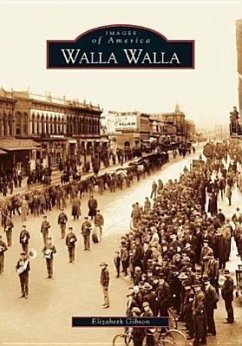Nestled at the foot of the Blue Mountains in the southeastern corner of Washington State, the area that would become Walla Walla was the home of the Cayuse, Umatilla, Walla Walla, and Nez Perce Indians. Fur traders and missionaries began to carve out settlements in the early 1800s, but with the lure of nearby gold in the 1860s, the landscape was soon dominated by commercial, banking, and manufacturing enterprises. As the boom ended, the resilient residents of Walla Walla turned to farming, and today, sweet onions, wheat, grapes, and other agricultural products continue to play an important role in the local economy and the community's unique identity.
Hinweis: Dieser Artikel kann nur an eine deutsche Lieferadresse ausgeliefert werden.
Hinweis: Dieser Artikel kann nur an eine deutsche Lieferadresse ausgeliefert werden.








